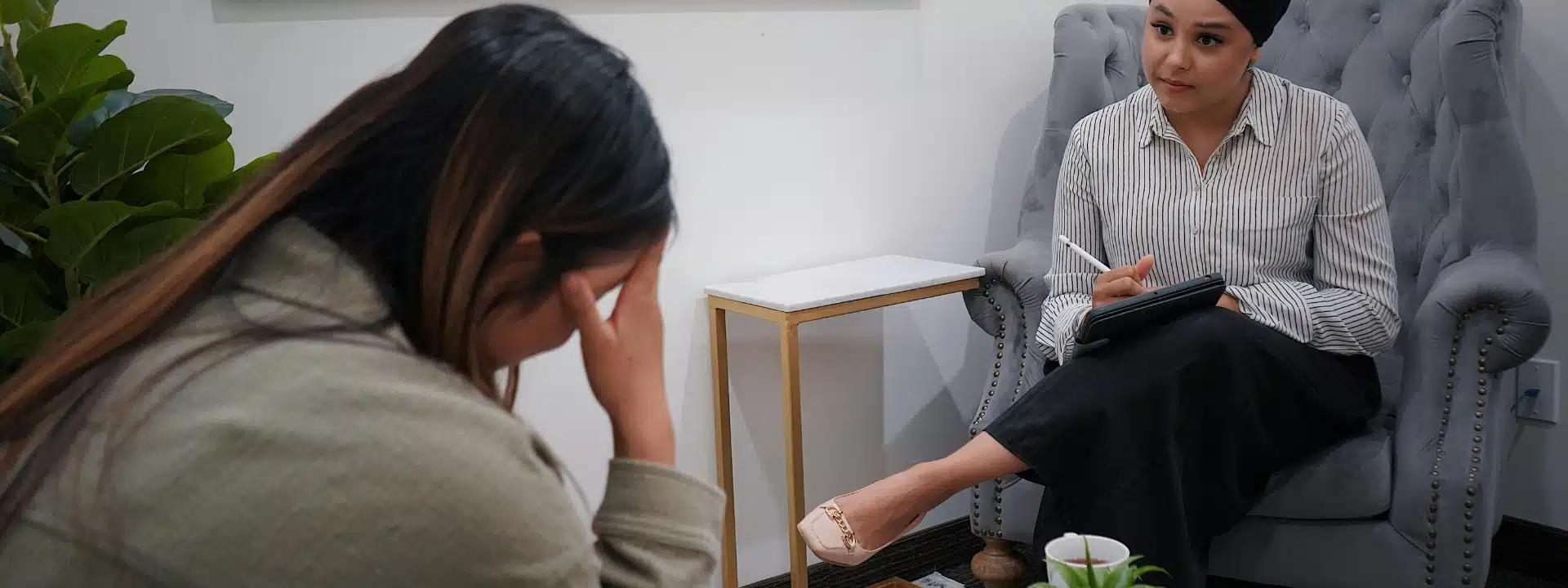Everyone experiences anxiety sometimes, it is a natural human response to certain events like meeting a difficult deadline or feeling stressed about a financial situation. Feeling stressed, worried, frustrated, or overwhelmed is common during tough times. Usually, we feel anxiety in direct response to a certain situation, and when the situation has been resolved, the anxiety naturally fades away. Once the anxiety has resolved, we are able to return to our normal state of being.
Anxiety disorders are a different experience. If you are struggling with an anxiety disorder, the anxiety never quite fades away. The anxiety lingers and starts to affect your ability to function. Often, anxiety can start with relatively mild symptoms and then start slowly getting more and more intense. It may be you don’t realize how much anxious feelings are starting to affect your life.
Common Signs of Anxiety
There are some typical symptoms of anxiety that are fairly easy to recognize. Anxiety is often accompanied by physical symptoms like shortness of breath and rapid heart rate. Sometimes people experience sweating or shaking, too. Changes in eating and sleeping habits can also be caused by anxiety.
Mental symptoms of anxiety include feeling worried or scared and being unable to pinpoint a cause for those feelings. You might be experiencing anxiety that manifests through trouble concentrating. Anxiety can also cause you to feel unreasonably restless or tense. You may be feeling the effects of low energy, even if you are getting enough sleep at night.
Hidden Signs of Anxiety
Sometimes symptoms of anxiety are a little more complex and take some deciphering. You may not recognize the more common physical and mental symptoms of anxiety. It may be necessary to look at areas of your life that can be affected by anxiety instead. There are a few warning signs to watch for when considering whether you are struggling with hidden anxiety symptoms, which include:
- Struggling with work or school and feeling the desire to avoid responsibilities
- Experiencing unexplained pain or feelings of unease, such as headaches and indigestion
- Feeling the need to self-medicate uncomfortable feelings with alcohol or other substances
- Having a hard time falling asleep at night because of racing thoughts or uncomfortable feelings
- Opting out of activities that you used to enjoy, like hanging out with friends
- Feeling constantly irritated, easily angered, or frustrated without cause
- Having an urgent need to leave situations for no apparent reason
- Random feelings of disorientation or dizziness
It is crucial to recognize if feelings of anxiety are having an impact on your life. Anxiety symptoms may be affecting your ability to function in your day-to-day life without you even realizing it. If left untreated, anxiety can continue to grow and become much harder to deal with. It can even put your body into a constant state of stress, which can have long-term effects on your physical and mental health.
5 Daily Practices to Reduce Anxiety
If you recognize some of the signs of anxiety in your own life, there are a few things you can add to your daily routine that will help you reduce your anxiety symptoms.
- Add exercise to your regular routine. We all know that exercise is good for our physical health, but it can have a tremendous effect on our mental health as well. Physical exercise can help your brain regulate your brain’s response to anxiety and stress.
- Start a journal. Journaling can help you process your negative thoughts and release the tension that accompanies them. It is also a great way to change your focus if you also journal about positive things in your life.
- Take a walk outside. Being outside has been shown to have many positive benefits for our mental and physical health. Being exposed to fresh air, sunlight, and nature can help relieve anxious feelings. Even just a few minutes a day spent outside can be beneficial.
- Clean and organize one space in your house. If you have somewhere you can spend time that is neat and decluttered, it can help you feel calmer and less anxious.
- Talk to someone about your feelings. Sometimes the best way to deal with negative thoughts is to get them out of your head. Talking to a friend or family member about your worries and fears can help you process them faster.
Incorporating habits into your daily life that can reduce your anxiety will help you manage your symptoms and get you feeling better faster. If your anxiety symptoms feel overwhelming and you are struggling to manage them on your own, you should consider seeking professional treatment.
Treatment Options for Anxiety
If you have concerns about anxiety symptoms and how it is affecting your life, it may be a good idea to seek the advice of a medical professional. If you decide this is a good option for you, your primary healthcare provider is a good place to start. They can help you decide how to proceed and also help rule out any physical health problems that might be contributing to your anxiety.
Common treatments for anxiety include therapy, medication, or a combination of both. Cognitive-behavioral therapy (CBT) is one of the most effective treatments for anxiety and anxiety disorders. CBT generally focuses on teaching people specific coping skills and management strategies that will help them reduce their anxiety. As you progress through therapy, you will be able to improve your symptoms and start to reduce the impact that anxiety has had on your life.
It is essential to remember that your treatment plan will be as unique as you are; you may need to try a few different options before you find the right fit for you. Be patient, communicate with your doctor about any questions or concerns you have, and always follow your treatment plan. Trust the process, and now that you will find the right combination of therapies that works for you.
Feeling anxious or stressed is a natural response to difficult situations, but sometimes the feelings of anxiety never fully go away. When you are experiencing anxiety for a prolonged period of time, it can start to impact your life. At Alter Wellness Care, we offer specialized resources that can help you recognize and manage symptoms of anxiety. We strive to help each of our clients set goals to improve their mental health and help them gain the tools they will need to achieve those goals. To learn more about how we can help you, call Alter Wellness Care at (866) 311-3510. Let’s get you started on the path toward feeling better together.



